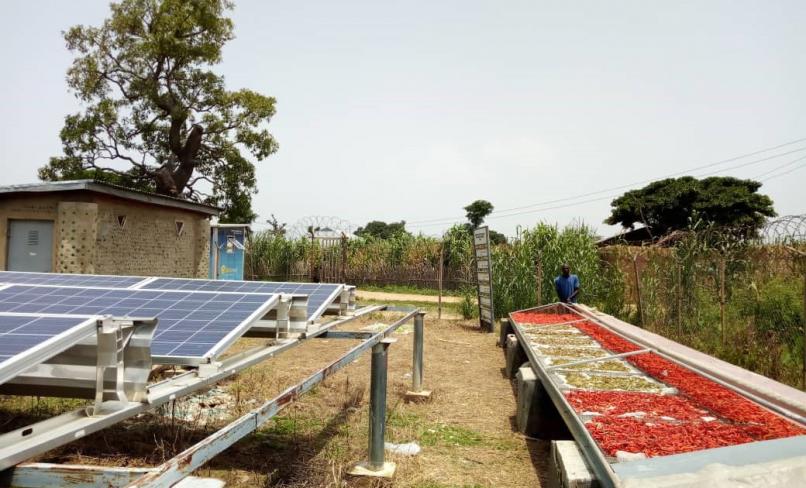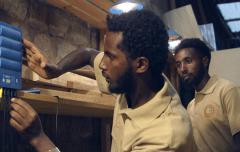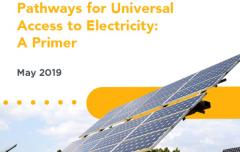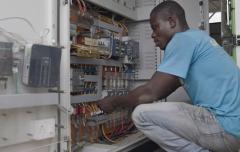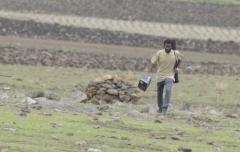Sosai Renewable Energies Company project leads to emergence of new community-based businesses
A project initiated by Sosai Renewable Energies Company, a Sustainable Energy for All Electrification Accelerator member, is proving that access to sustainable, reliable electricity opens the door to an array of new economic opportunities.
In 2017, the social enterprise, based in Kaduna State in Northern Nigeria, designed and implemented a community development project after receiving a grant from United States African Development Fund (USADF). The project involved the installation of two solar mini-grids, two solar kiosks and two solar dryers for agricultural processing, all in different rural communities in Kaduna.
“Sosai did the project design, community engagement, installation and maintenance of the project from start to finish,” Habiba Ali, CEO of Sosai, explained. “The fact that we are a local company with networks in these communities really helped us gain the trust and support of residents for the project.”
The target communities had never been electrified and the expectation of the project was to connect 50 households to the mini-grids. Now, 86 households and businesses are connected to these mini-grids and four businesses have been created thanks to the solar kiosks and dryers.
Amiru Garba lives in one of the mini-grid communities. Prior to the mini-grid installation, Garba was a petty trader, but with a stable power source brought to the community he saw a new business opportunity. He loaned money to buy a freezer and started selling cold drinks to locals out of his home.
"The electricity in our community has boosted my business very well,” Garba said. “When I started selling cold drinks, I usually purchased just one crate at a time, but now I have a full van of drinks delivered.”
He says the income he has earned from his business has not only allowed him to pay back the loan, he now owns his own shop.
Meanwhile, the solar kiosks that were installed as part of the project are being managed by women entrepreneurs recruited by Sosai under its Matan Arewan Sosai Initiative, which recruits and trains women to be successful renewable energy entrepreneurs. Like Garba, the women have set up businesses selling cold drinks and daily necessities; they also do commercial phone charging for locals.
The solar dryers have had dramatic impacts for farmers in project communities. The two solar dryer communities are popularly known for tomato and pepper farming. These crops are highly perishable, and during the harvest season, local farmers are used to losing over 40 percent of their produce and are forced to sell most of it at very low prices to avoid complete loss.
To alleviate losses, farmers would traditionally dry produce through a slow and unhygienic manner on the ground, exposing it to potential contamination. The solar dryers have solved this problem. During the harvest season, local famers will sell their fresh produce at market and then come to solar dryer businesses to dry any remainder in a hygienic manner and in half the time needed to dry it traditionally. The farmers are then able to sell the dried produce in the market for a premium because of its high quality—the dried crops maintain their natural colors and have a longer storage life.
Adamu Suleiman is a farmer in Kadabo. Before the solar dryer installation, he would need to sell a basket of tomatoes for as low as 300 Naira (USD 0.83) at the local market to avoid the tomatoes perishing and not earning any income from them. Now he sells all his fresh tomatoes at 1,000 Naira (USD 2.76) knowing that any leftovers can be dried and still sold at a profit.
Farmers are not the only ones empowered by the dryer installations. These dryers are managed by women recruited by the Matan Arewan Sosai Initiative, giving them new employment opportunities as part of a profitable venture.
The Sosai project is strong example of the far-reaching economic and social benefits of bringing renewable energy access to last-mile communities that do not have grid access. Across Nigeria, only 23 percent of the rural population has access to electricity, according to the latest Tracking SDG7 findings.

